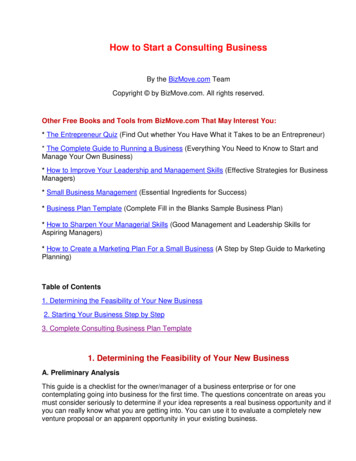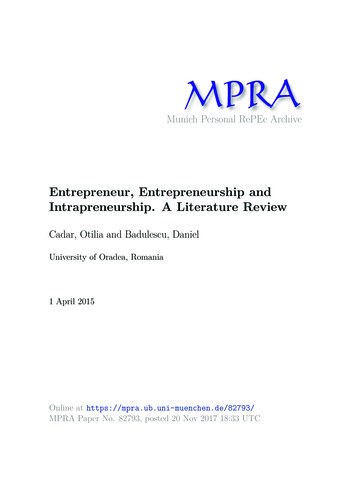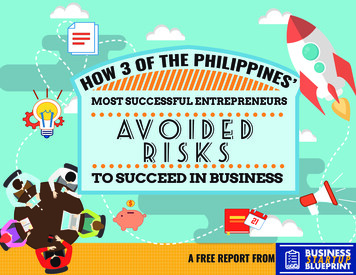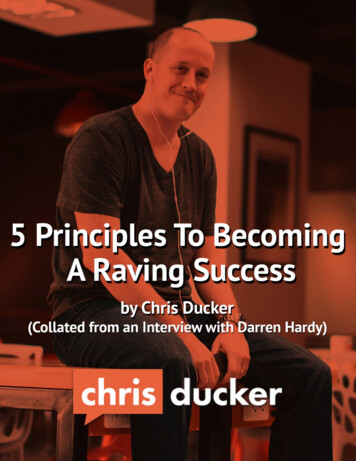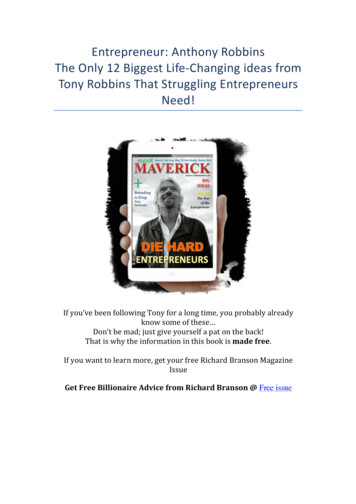
Transcription
ruoyeBssobnow?The young entrepreneur’sguide to starting a business
2The young entrepreneur’s guide to starting a businessBigIdeas.walesCONTE NTSWhether you are thinking about business for the first time, or youhave an idea that you want to develop, this guide will help you keepon track and think through the challenges of starting a business.Have you got what it takes to start your own business?4Coming up with a business idea6Part of the Welsh Government’s Business Wales programme,Big Ideas Wales is the first stop for young entrepreneurs andsupports young people through online resources, business skillsworkshops and one to one sessions with an adviser to helpmake your ideas a reality.Turning your idea into reality8Register your details online at www.bigideas.wales to keep upto date and join our network to learn from other entrepreneurs.Interested in taking your business idea forward? Ask about ourBootcamp to Business. Crown copyright 2017Digital ISBN 978-1-78859-860-6WG32944@BigIdeasWales Crown copyright 2017Print ISBN sONLINE– Englishand welshPRINT – bilingual Hawlfraint y Goron 2017ISBN digidol 978-1-78859-861-3WG32944 Hawlfraint y Goron 2017ISBN argraffu 978-1-78859-862-0WG32944Researching your market12Creating a brand14Getting online on a budget16Getting the most out of business support18Meeting your business adviser!20Making a business plan22How to start your business on a shoestring24How to get funding26How to set prices28Managing your money30Dealing with tax and law32Managing your time34Growing your business363
4PART 1The young entrepreneur’s guide to starting a businessHave you gotwhat it takesto start yourown business?If you are thinking of starting your own business,you’re not alone. Lots of young people dream ofbecoming their own boss and have ideas for theirown business – and many of them are starting onthat path right now.BigIdeas.walesDidyouknow?70 %en yourYou get the rewards whhard work pays offreerYou are taking your cainto your own handsMoney is not the only motivating factor. It’s aboutdoing something you’re passionate about, creatingthe life you want and building something you canbe proud of.The SWEETbenefits ofstarting youngTOFFEETimeYou’ve got years to builda successful businessOptimismYou believe you can make it workFreedomYou don’t have anything holdingyou backFlexibilityYou’re prepared to try somethingnew and take risksEnergyYou’re willing to put in the hoursEnthusiasmYou have the ambition to succeedof working 16-24 year oldssay they would like to be their ownboss at some point in the future(Wales Omnibus Survey, 2016)The PROS and CONSof working for yourselfcisionsYou make your own detimeand manage your ownmeone else’sIt’s your dream, not soYour earnings will be irregularYou won’t get paid forholidays or sickleaveYou may miss theoffice social lifeYou will have towork long hoursThe recipe for successWhen should I start?PassionSuccessful entrepreneurs are often described asbeing “passionate” about their business. But whatis passion? It’s about your emotional investment;it’s about believing in your idea 100%. And yourenthusiasm is infectious – it will persuade othersto support you and buy from you.Starting a business is a step-by-step process.There’s no time like the present to takethe first step PersistenceNothing comes easily in business and no one getseverything right first time. The qualities that makesuccessful business people stand out from the restis their determination and persistence – even whenthere are setbacks.5“Start your business now.Don’t wait until your coursefinishes, or for when every littlepiece of paperwork is in place,believe in yourself and in youridea. Start now.Steve Dimmick, doopoll”
PART 2The young entrepreneur’s guide to starting a business6BigIdeas.wales7How do you knowif your idea will fly? Come up with an elevator pitch for your business –that sums up your idea in a couple of sentencesComing upwith abusiness idea Try it out on people and see how they react Is there enough demand for what you are offering?Don’t forget Every businessneedssellinga uniqupoint (eUSP) Twhy cuhink abstomerouts shoulyou oved choor anyonsee else.could wYour USell be bPased olevel ofn theserviceyou proKnow yvide.our own strenit’s alsogths, butimpor tant to bwith yoehonesturself about wneed hhat youelp with.Not every business starts with a “eureka” moment. The truth is that most successful businesses arenot based on an amazing invention or a radical new idea – they are simply better versions of what’salready out there.Your business idea has to fit your skills and personality and have the potential to make money.Here are a few things to consider that could help you decide what to do:1What kindof worksuits you?List some of the things thatmake you you. Are you creative?Organised? A people person?Are you good with paperworkor better at making things?Do you prefer working aloneor as part of a team?2What areyour hobbiesand interests?Almost any interest that isshared by others can be turnedinto a business. If you love whatyou do, you’ll enjoy it more andyou’ll be better at it too.3“Find a gap in the Use their feedback to create a profile of your target customerDo you havea skill that’sin demand?There are always skills thatpeople are prepared to payfor – whether you are a greatcook, a website designer ora bike mechanic.4Can youspot a newopportunity?Opportunities are out there –you just have to recognise them.Is there a new demand for aparticular product or service?Or has a business closed in yourarea leaving a gap for you tostep into?5What hurdlesdo you have toovercome?Think about the things thatyou struggle with. This couldinclude anything from dealingwith people or negotiating tomanaging your time. Does thischange your plans, or can youtackle areas of weakness orfill gaps in your knowledge?6market, develop aniche, never competesolely on price andmost importantlybelieve in yourself. Ifyou have done yourresearch, know yourmarket and productyou can find thesupport and skillsyou need to makeyour idea a realityand then make thatreality a success.Helen Walbey,Recycle Scooters”Can yousolve aproblem?Anything in life that doesn’twork well or is in short supplycould be the basis for asuccessful business. Listen toothers when they complainabout things – common gripesoften spark a new business idea.
8The young entrepreneur’s guide to starting a businessPART 3Turning youridea into realitySo you’ve got a greatidea for a business –what happens next?The chances are you’ve got more questions than answersat this stage. To move forward there are lots of things you’llneed to find out – and a few decisions you’ll have to make.Dealing with doubts It’s natural to have doubts at this point. Don’t letthem hold you back – but don’t bury your headin the sand. Now is the time to gather informationand challenge your ideas until they are more refined.What happens next?Your business isn’t a business until you make thefirst sale – and it can take considerable time to getto that point. This planning process will be crucialto the success of your business.BigIdeas.wales5 THINGSyou can doright now1. Assess the demand for your ideaTalk to potential customers and ask them about their needs. Reallylisten – what they say may well change your mind on a few things.2. Improve your skillsSign up for a course and get better at the thing you want to do,whether it’s website design or jewellery making.3. Build your business know-howLearn about finance, marketing, the legalities of starting up. There areplenty of short courses and workshops to help – this is also a greatway to meet others in the same situation.4. Get some experienceGo and work for someone else for a few months. You will learn howthe business works, what customers expect and – most importantly –what you could do better.5. Try it outStart small and test your product in the marketplace to see if thedemand is there. This also allows you to gather feedback and workon your business whilst you are still in education or working.9
10The young entrepreneur’s guide to starting a businessPART 3It’s time to decide1. What kind of business will it be?There is more than one way of running abusiness. How will you run yours?First – who are your customers? If you sell to other businesses, you’re inbusiness to business. If you sell to people, you’re in businessto consumer.Now think about your business model Are you planning to set up a social enterprisethat supports a cause or local community? Do you want to buy a franchise – such asa branch of a pizza chain or gym? Or, do you want to sell to people directly,in their own homes?2. What kind of businessstructure will work best for you?Sole traderIf you are planning a simple cash in-cash outbusiness as a freelancer or one-man-band(also known as self-employment).Limited companyIf you want to take advantage of bettertax breaks, reduce your financial liabilitiesand/or plan to employ staff.PartnershipIf more than one of you want to set up in businesstogether it’s common to set up a partnership.Case Study: GorjysHow long does it actually take to turn an idea into reality?Could you be a ‘social’ entrepreneur?If you want to start a business to bring aboutsocial change or to support your community youmay be a social entrepreneur.A social enterprise reinvests any profits backinto the business or community, rather thanmaximising profit for shareholders or owners.You need to understand the options and alternatelegal structures of running a social enterprise.Learn more about social enterprises by searchingonline for Social Business Wales. Will you sell products or services? Will you sell online, face-to-face or via aretail outlet?BigIdeas.walesFaceyour fearsStarting a business can be one of the mostexhilarating experiences in your life – don’t beput off by nagging doubts and fears such as: Failure – mistakes are inevitable, startinga business is a real learning experience. If itdoesn’t work out, so what? Listen to advice,learn from mistakes and try again. You willnever know if you don’t give it a proper go. Money – you have to do the math! Use theadvice on “bootstrapping” in part 9 of thisguide to minimise your risks. Fear of the unknown – probably bothexciting and scary! You can minimise this fearwith a clear focus and a willingness to adapt ifthings aren’t going your way. It can be lonely at the top – you call theshots but seek out trusted allies in your advisers,mentors and critical friends. Read books byother entrepreneurs and learn from others.The Gorjys Secrets Festival is a showcase of north Wales food, drink and artistic talent puttogether in just 12 weeks by a group of entrepreneurs. But this was only possible becauseGorjys’ founders spent years honing their entrepreneurial skills in other businesses.One of their directors, Tansy Rogerson, ownsArmadillo Events, which she started in 2014with a few battles along the way: “When you’refirst starting up, it’s the ‘small’ things that canbe frustrating; my business name, web domainand finding the right accountant took monthsto nail down. I wanted to change the worldimmediately, but that doesn’t happen.”Fellow director Gavin Mart was an entrepreneurfrom childhood and branched out into musicin his twenties, creating event companies,community organisations and charities:“What I’ve discovered over the years is that thelead-in times needed to set up ventures reduceas you pick up more entrepreneurial skills.”Gorjys director Jonathan Hughes set up GreatOrme micro-brewery in 2006. It took two yearsto brew his first beer and another three toemploy staff, but his patience paid off: “Thereare now seven of us full time, and Great Ormeis expanding as a brand across the UK.”The lesson? It may take years to really get abusiness off the ground, but the experience willstay with you and help you succeed in future.Some Gorjys tips Plan ahead: Making a success out of yourfirst business takes time, but planning is anintegral part of the process. Don’t give up: All entrepreneurs agreethat the lessons learned when they startedstayed with them over the years, and makethem better business people. Work together and get support:Gorjys was made possible because wefound like-minded people to work with.Embrace the support that’s availableto you.11
12PART 4The young entrepreneur’s guide to starting a businessBigIdeas.walesResearchingyour marketWhile entrepreneurs use their gut instinct fromtime to time, the truth is that most successfulbusinesses are built on customer research,market analysis, measurement and testing.Market research tells you who is buying what,when, where and why. It doesn’t have to beexpensive - there’s a lot you can do yourself.When you’re startingout, it’s essential toidentify potentialcustomers, find outwhat they are lookingfor and get theirfeedback on your ideas.What canyou askpotentialcustomersabout?Their views may changeyour strategy; they willalso help you build apicture of your idealcustomer. Then youcan find out if thereare enough of thesecustomers out thereto make your businessa success.ssner busi Younameding Branuct Produres FeatFace-to-face researchallows you findout what potentialcustomers really thinkand what their needsare. Be careful whenasking friends or familyfor their views – theymay be too nice to givehonest feedback!miseice pro ServIt’s a good idea toshow your potentialcustomers a prototypeof your product orexamples of yourmarketing so theycan give you specificfeedback. Ask themwhat they’d beprepared to pay;and above all, don’tignore criticism.How to domarket researchfor FREEFour easy waysto keep an eye onyour competitors Carry out customer surveys using emailor tools like Survey Monkey1. Ask a friend to be a “mystery shopper”by calling or visiting a competitor business Do online polls (via your website or Facebook)2. Ask customers about their experiencesof buying from your competitors Put together your own focus group to getin-depth feedback Conduct desk research (gather statisticsfrom industry bodies, libraries and governmentwebsites)3. Check out the ratings and reviews that yourcompetitors are getting online4. Subscribe to their email newsletter andmonitor their social media postss USPaging Pack Price Marketiasng idedon't forget. .usiness evolves.brouyasustomers want.cginsitstttehawKeepoftghsiits way if it losesseloncasesinusbynA13
14The young entrepreneur’s guide to starting a businessPART 5BigIdeas.wales15Creating aWhaT's ina name ?Building yourbrand toolkit –step by stepStep oneDraw up a list of brandcharacteristics for yourbusinessStep two The name needs to be easy to pronounce,spell and remember.Think about where yourbranding will appear. Thiscould include a business card,brochures, your website, onsocial media, at your premises,on the side of your vanor even on staff uniforms.Step three It should be unique. Check the National BusinessRegister to see if there are any other businesseswith that name.Ask a freelance designer tohelp you create your logo andbrand identity.Step fourDevelop the right “voice” foryour business based on yourbrand characteristics – this willhelp you to write consistentand effective marketingmessages.Choosing a name for your business can be a funtask but there are some serious issues to consider:First impressions count.Every business, no matter how small,needs its own brand identity.A brand is essentially the character of yourbusiness; and branding is about controlling theway your business is perceived. If you don’t workon your brand, you risk leaving your image andyour reputation to chance.The right branding can help you raise awareness,attract customers, build loyalty and encourageword of mouth recommendation.Your brand has to appeal to the audience you aretargeting and must convey your unique sellingpoints (USPs). It can help you stand out from thecrowd and become a well-known name in yourlocal area or sector.Once you have devised your brand identity, it’s upto you to make sure your business lives up to itsbrand promise. Can you get a suitable domain name andsocial media handle? Consider the benefits of using Welsh? It may also need to work overseas (try translatingyour name on Google). If you are a sole trader or in apartnership you can’t put Ltdor plc after your business name.Many business owners choosea descriptive name so it’s obviouswhat the business does – and it’seasily found online. Always testyour ideas for business nameswith potential customers.How I came up with mybusiness name “The customer makes a shopping decisionwithin the first 3 seconds, so it is superimportant for Get Wonky to stand out fromthe crowd and give wonky fruit a chance!Get Wonky was actually the first name ideawe came up with. We wanted a quirky,nonsense name that would express ourethical values with a degree of enthusiastic,wonky approach!Maciek Kacprzyk and Karina Sudenyte,Get Wonky”
The young entrepreneur’s guide to starting a businessPART 6Getting onlineon a budgetBigIdeas.walesBuilding a websiteWhen it comes to building a website, you have three options: Build it yourself from scratch – great if you have the skills Use a DIY template from platforms such asWix, Wordpress or Go Daddy Ask someone else to build it for you;try skill swapping to save moneyEvery business needs to get online, usually witha website - to tell people who you are, whatyou offer and how to get in touch. And if you’replanning to sell online, you’ll need an e-commercewebsite that can accept online payments securely.To get online, you’ll need to: Register your domain name Find a web hosting company Build your websiteMany platforms offer all of these services in oneplace – often for low prices.Your domain name is the first place to start.Try to keep it short and easy to remember.You may want to register more than one version –such as .com as well as .co.uk or .Wales.Domain name registration costs vary but startat just a few pounds a year.The costs involved in building a website varywidely. For simple websites, DIY templates areusually the best way to go as they are cheapand easy to use.Social mediaSocial media encourages people to spread the word about yourbusiness by sharing your comments, posts and images.If you’re already using Facebook, Twitter, Snapchat, Pinterest,LinkedIn or Instagram, you’ll be familiar with how they work.Being active on a few of the most relevant social media sitesis likely to be a key part of your marketing strategy – and thegood news is that they are free!17Getting tothe topof GooglesearchesIf you want to be seen bycustomers online you’ll needto make sure your websitegets noticed by Google.You can do this by using atechnique called Search EngineOptimisation – SEO for short.SEO16SEO is about using key wordsand phrases in your onlinecontent so that your websitecomes up when someonesearches for a product orservice like yours. There’s loadsof advice about SEO online– once you have learnedthe basics you can keep on“optimising” your website byadding relevant content suchas blogs.Don’t forget eer great freEmail is anothp inl. You can keemarketing toondingstomers by setouch with cunewsletters orregular emaileing them a linsimply droppr theme. Sign up fofrom time to tits newsletter aBig Ideas Walewaleswww.BigIdeas.
18The young entrepreneur’s guide to starting a businessPART 7BigIdeas.wales19The type of support on offer includes:ehtgnitteGfotuotsomtroppusssenisuboungt stop for yrsfiethisaleswalesBig Ideas Ww.BigIdeas.wwitisv–ursurcesentreprenee and resoicvdas,aeof idto find lotssiness.ch your bunulauoyto helpmentelsh GovernWethyberdffereare also othreeSupport is othtubs,siness Walee stillthrough Buyou. If you’rlpehnacos whom yourorganisations on offer frt’ahwtuolikeeckvisit othersldustudying, chocuoyniversity, orcollege or uTrust.The Prince’scharge aded or onlynfuyllfuteeht bto pay full raevaServices mighlilw– if not youmittednominal feeisely. Be comwemtireuose yand make thderefor advice. Ugasnoon the actir’s time.to follow uper or mentoisvdaruoymost ofEventsand eThere are workshopsavailable acrossWales to build yourbusiness knowledgeand develop yourunderstanding oftopics such as finance,marketing andbusiness planning.These are a greatway of learningthe essential skillsquickly to meet otherentrepreneurs andshare experiences.wales.business-events.org.ukThrough BusinessWales’ free BusinessOnline Support Service(BOSS) you learnessential business skillsat your own pace,whatever the hour!businesswales.gov.wales/bossA great way to honeyour business skillsand meet otherentrepreneurs. Theycan also bring practicalhelp or cash prizesuseful for you andyour business, andsome great PR.Follow Big Ideas Waleson @BigIdeasWales orlike us on Facebook andsend us your questions!Mentoringor coachingCo-workingspaces, incubationand acceleratorprogrammesFinance, grantsand loansOffered by otherentrepreneurs orbusiness professionals.Mentors and coachescan share valuableexperiences and helpguide you on theright path.You can apply to bepart of a communityof entrepreneurs atone of these spacesacross Wales to getintensive support andbenefit from workingalongside likemindedpeople.What you can getdepends on eligibility.Low-interest loans suchas Start Up Loans arecustomary for newbusinesses, grants tendto be for businessesthat are already trading.Your business adviserwill guide you throughsome options.How do I find out about help available? The Business Wales helpline offers a diagnostic as well as information and signposting service. Give the team a call on 03000 6 03000, use our live chat or register at:www.businesswales.gov.wales/contact-us Join our Big Ideas Wales young entrepreneurs’ network and register to see a business adviser at: www.businesswales.gov.wales/bigideas/registration Talk to Enterprise Champions at colleges and universities to find out about help they can offer. Attend one of our Big Ideas Wales events: www.bigideas.wales Follow Big Ideas Wales on @BigIdeasWales or like us on Facebook and send us your questions!
20The young entrepreneur’s guide to starting a businessPART 7BigIdeas.walesMeeting yourbusinessadviser!We have a team of dedicated business advisers across Wales. Here’s ahandy list of FAQs to help you find out more about how it all works.Q. Why do I need to see an adviser?Q. Do I need to bring ID?Your adviser can help you take the final steps to starting your business, by providing you with toolsand resources you need. They can also introduce you to a role model and signpost places you cango for more information.No, the adviser/client relationship works on trust; the first step is to trust that you are who you sayyou are and that you are eligible to receive support.Q. When will I know when I am ready to see an adviser?If you’re serious about getting your business started you will instinctively know – your collegeor university could help too. Your adviser will tell you if you need to spend more time developingyour idea.Q. Do we meet in person?The adviser will usually phone you in the first instance; subsequent visits can be in person.Q. What will I need to prepare before the meeting?Think about how you can describe your product or service, what market research you have doneor need to do, who your customer is, what your competitors do and what makes you different.Bring anything relevant, like your draft business plan or marketing materials.Q. Will an adviser help me get funding?The adviser will identify sources of funding that may be appropriate. They can also help you create abusiness plan or cashflow forecast.Q. What happens next?You tackle some of the items on your action plan, you will review progress at your next meeting andidentify further work needed.Q. What if I don’t “gel” with my adviser?Don’t worry, on the rare occasion this happens, we can offer you a different adviser. If they aren’t inyour area though, your new adviser may not be able to meet you in person.Q. What if I need to cancel/postpone my meeting?Q. Where will we meet?Please let your adviser know as soon as possible, the adviser can then make a new appointmentwith you.Somewhere informal like a café or at your college or university – you can bring a friend or familymember if you wish. Your adviser will not come to your home.Q. How do I get in touch with a business adviser?Q. What will happen in my first meeting?The adviser will talk to you about your business idea, how you want to develop it and what youneed to do to get started. You will come away with an action plan; the adviser may also take awaysome actions to work on.In the first instance contact Big Ideas Wales onemail enquiries@bigideas.wales, call 0300 060 3000or send us a message on Facebook or Twitter.21
22The young entrepreneur’s guide to starting a businessPART 8Making abusinessplanBigIdeas.walesTen things to include in a business plan1.A description of yourbusiness5.A description of your brandidentity and a list of USPs2.A profile of your targetcustomer, including keydemographic details such asage and gender6.What you plan to charge foryour products or services7.How you intend to promoteand market your business8.Financial costs, includingany funding requirements9.Projected sales, profits andcashflow forecasts3.4.A business plan is absolutely crucial for any newbusiness. It’s a road map showing what the businessis all about, where it’s heading and how you aregoing to get there.“I love being in controlof a young andexciting companythat challenges meevery day. Runninga business has bothhighs and lows, butbeing organised is key.Know where you’reheading and how youplan to get there.Adam Amor,Buffoon Film and Media”A good business plan should provide a realistic picture of your business,including timescales, budgets and sales forecasts. You may need helppreparing your first budget, to get accurate costs and sales projections.Don’t be put off, there’s advice online and your business adviser will alsoguide you through each aspect.Predicting what’s going to happen in the future is not easy. Don’t be temptedto make up pie-in-the-sky sales targets that you are unlikely to hit.Some use a “business model canvas” – a visual tool to design, map andreflect on your approach to the business model.Many small businesses start out using a “lean” approach by keeping theircosts to a minimum and only growing as money starts to come in – alsoknown as “bootstrapping”.Above all, it’s important to remember that business plans are not set instone. They change as the business develops; updating your plan regularlyis good practice.23Facts and figures aboutthe market you’re in andanalysis of your competitorsOperational details premises, equipment,distribution10. An action plan for theyear aheaducial ifA business plan is crr financeyou are applying fostors,or approaching inveso also include:ive A one-page executl thesummary that lists alsinesskey points in your buplanorting Any necessary suppdocuments, such aspatents or contractstice – A confidentiality noandto protect your ideareadsinform anyone thatat it isthe business plan thconfidentialSMARTthinkingWhat is aSWOT analysis?When you are setting business goals make surethat they are SMART:SWOT stands for Strengths, Weaknesses,Opportunities and Threats. It’s a way tosystematically assess your chances of A SWOT analysis can help you create a realisticbusiness plan.Your strengths and weaknesses are the thingsyou have control over. They could include yourassets, your location, your expertise, reputationor resources.Opportunities and threats are external thingsthat you can’t change; these are the things youhave to respond to. They could include changingconsumer behaviour, issues with suppliersor new competitors.
24The young entrepreneur’s guide to starting a businessPART 9BigIdeas.wales251. Work from home2. Build your own website using free or cheapapps such as Wix and WordPressHow to startyour businessways tostart upa businesson thecheapgnirtseohon a s3. Sell on established marketplaces such asAmazon and eBay or sell via a market stallor pop-up shop4. Advertise for free on local websites suchas Gumtree5. Save money on phone calls by using Skype,Facebook Messenger, Whatsapp or others6. Ask for help from friends and family withuseful skills (finance, marketing, design, IT)7. Use cheap or free marketing methods – suchas social media, email, PR or leafleting8. Find freelancers if you need an extra pairof hands9. Use cloud IT services (many basic versions arefree) and save on expensive software thatcould quickly become out-of-date anyway10. Swap skills with other entrepreneurs for freeYou don’t need lots of money to start a business. In fact, if you start smalland lean you are more likely to build a profitable business in the long run.It’s all about testing the waters withoutrisking too much money – otherwiseknown as bootstrapping or using a“lean model canvas”.Bootstrapping is starting a business withno or very little money. Lots of successfulbusinesses started this way. It’s hard work– you have to do everything yourself andthere are no short cuts. But the beauty ofbootstrapping is that you don’t have towait for funding to get started.Bootstrapping is not just about keepingcosts down; it’s about creating a “lean”business that makes a profit. You startsmall, test as you go, get the basics rightand build your business slowly but surely.Business owners that embracebootstrapping often do really well –they are resourceful, hard-working,persistent and they never stop learning.Look beforeYOU LEAP Start by working on your business in yourspare time until you can confidently give upyour day job Consider using open spaces andserviced offices to save costs on rent Build a prototype and get advance sales beforeyou spend money on supplies or manufacturing Rent equipment to avoid having to make abig purchase“I started wi
2 The young entrepreneur’s guide to starting a business BigIdeas.wales 3 @BigIdeasWales BigIdeasWales BigIdeas.wales Have you got what it takes to start your own business? 4 Coming up with a business idea 6 Turning your idea into reality 8 Researching your market


